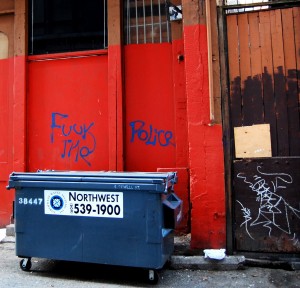The ‘Fuck The Police’ (or ‘Fuck Tha Police’) slogan emerged from hip-hop group N.W.A.’s 1988 album Straight Outta Compton. Since then, the phrase has become one of the most ubiquitous and familiar forms of graffiti in the Western world. The phrase falls squarely into the graffiti-as-resistance category; a symbol of the frustration of young black men in particular with the oppressive and racist treatment they receive from law enforcement officers.
The aim of this resistance is four-fold: First, the act of writing it is itself an affront to the law. Second, the graffiti self-consciously proclaims its own ‘deviant’ nature, and leaves a record of its resistance for everyone to see. Third, the graffiti was also left anonymously, showing the threat that an invisible, marginalized enemy can pose to state power. Fourth, the marking of this graffiti on physical space is a method of claiming territory by groups or individuals who feel they have no territory of their own or feel their territory has been taken away by the arm of the state: the police (Ferrell 79). This final attempt is similar to tagging, in the sense that it marks a space and challenges the ownership of that space (Rafferty 77-78). However, ‘Fuck The Police’ graffiti goes one step further, turning that challenge into a political message against state violence and repression, and against racism.
– Maura Doherty
References:
Ferrell, Jeff. “Urban Graffiti: Crime, Control, and Resistance.” Youth & Society 27.1 (1995): 73-92. Print.
Rafferty, P. “Discourse on Difference: Street Art/Graffiti Youth.” Visual Anthropology Review 7.2 (1991): 77–84. Print.

